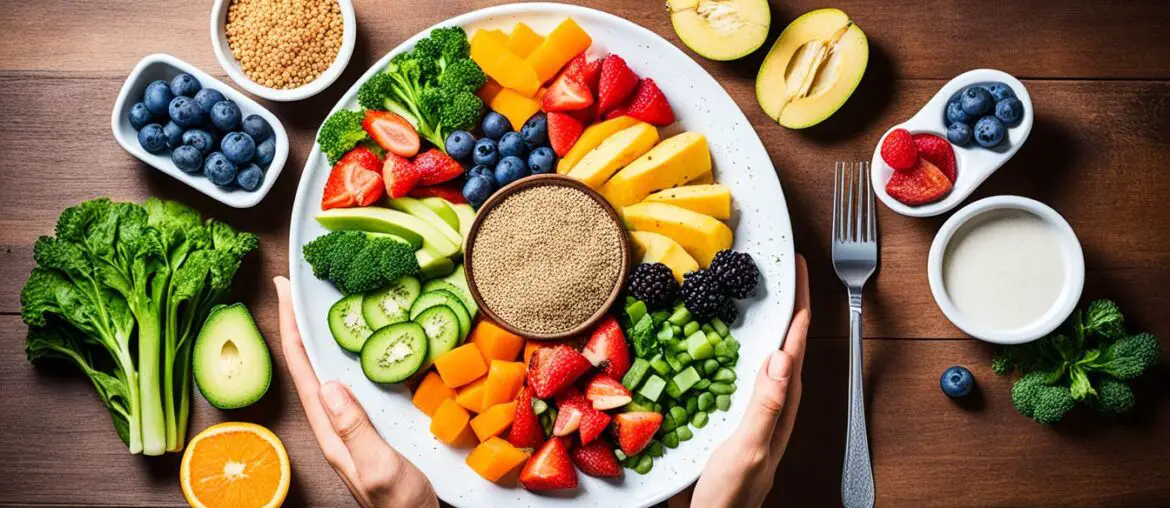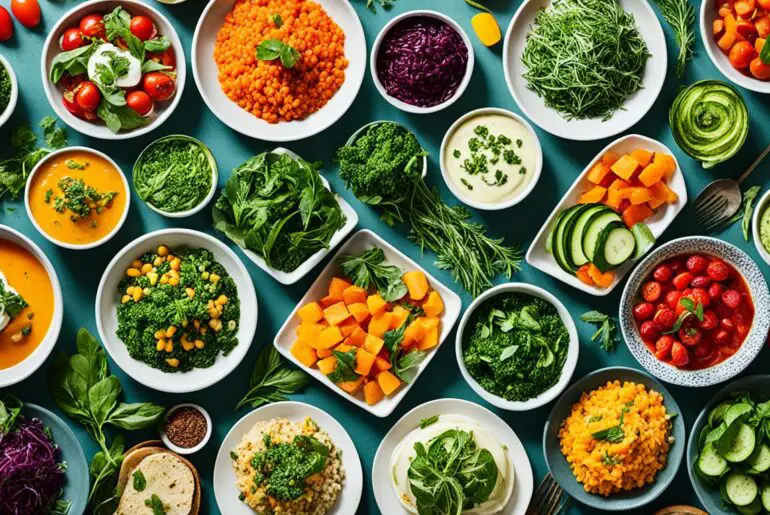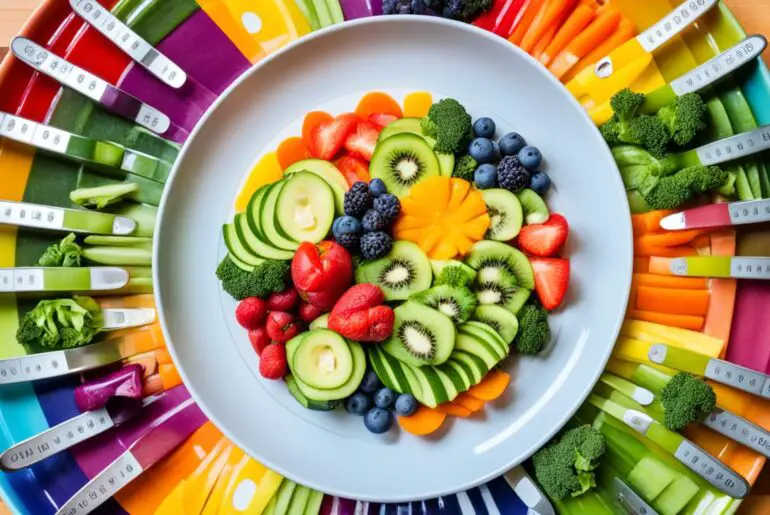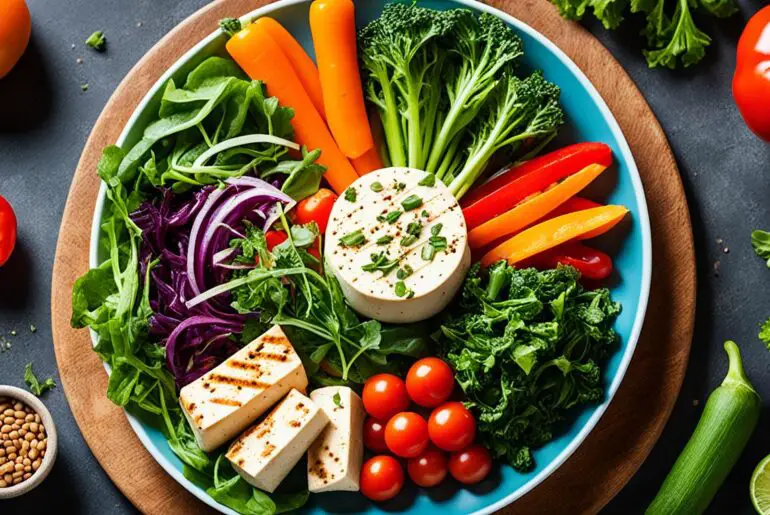As a vegetarian, you’ve made a conscious choice to exclude animal products from your diet. But what happens when you decide to embark on the HCG diet, which requires consuming 500 calories a day with half of the calories coming from animal protein? Are you doomed to face nutrient deficiencies? Or is there a way to prevent them and still achieve your weight loss goals?
The vegetarian HCG diet poses a unique challenge because it restricts traditional protein sources like meat. This can lead to potential nutrient deficiencies if not managed carefully. However, with the right knowledge and strategies, it is possible to avoid deficiencies and maintain a healthy and balanced nutrient intake while on the vegetarian HCG diet.
Vegetarian HCG Diet Options
As a vegetarian, you may be concerned about finding suitable protein sources for the HCG diet. While the diet traditionally emphasizes animal protein, there are several vegetarian-friendly options that can be incorporated to meet your dietary preferences. By making thoughtful modifications, you can ensure you’re still getting the necessary nutrients while on the HCG diet.
Dairy products such as Greek yogurt, cottage cheese, and low-fat milk can serve as excellent sources of protein. These options are not only high in protein but also provide essential vitamins and minerals. Incorporating dairy into your HCG diet can help you maintain a balanced nutrient intake.
Eggs are another versatile and nutritious option for vegetarians on the HCG diet. Rich in protein and essential amino acids, eggs can be consumed in various forms, such as scrambled, poached, or hard-boiled. Including eggs in your meal plan can help support your protein needs.
Soy products like tofu and tempeh also offer viable alternatives to animal protein. These plant-based options are not only protein-rich but also excellent sources of vitamins and minerals. Incorporating soy into your vegetarian HCG diet can add variety and balance to your meals.
For those seeking a convenient protein source, protein powders made from plant-based ingredients like peas or hemp can be a great addition to your HCG diet. These powders can be used to make smoothies or added to recipes to boost the protein content. Protein powders offer a simple and effective way to meet your protein needs.
Remember, it’s essential to consult a healthcare professional or registered dietitian before making any significant changes to your diet. They can provide personalized guidance and ensure you’re getting all the necessary nutrients while following the vegetarian HCG diet.
By incorporating these vegetarian HCG diet options into your meal plan, you can enjoy a diverse range of protein sources while meeting the requirements of the diet. The table below provides a quick overview of the protein content in selected vegetarian options:
| Protein Source | Protein Content (per 100 grams) |
|---|---|
| Greek Yogurt | 10 grams |
| Eggs | 13 grams |
| Tofu | 8 grams |
| Tempeh | 19 grams |
| Pea Protein Powder | 20 grams |
Remember to choose a variety of protein sources and incorporate them into your meals to ensure a well-rounded nutrient intake during the vegetarian HCG diet. With careful planning and consideration for your dietary preferences, you can successfully follow the HCG diet as a vegetarian.
Essential Nutrients for Vegetarian HCG Dieters
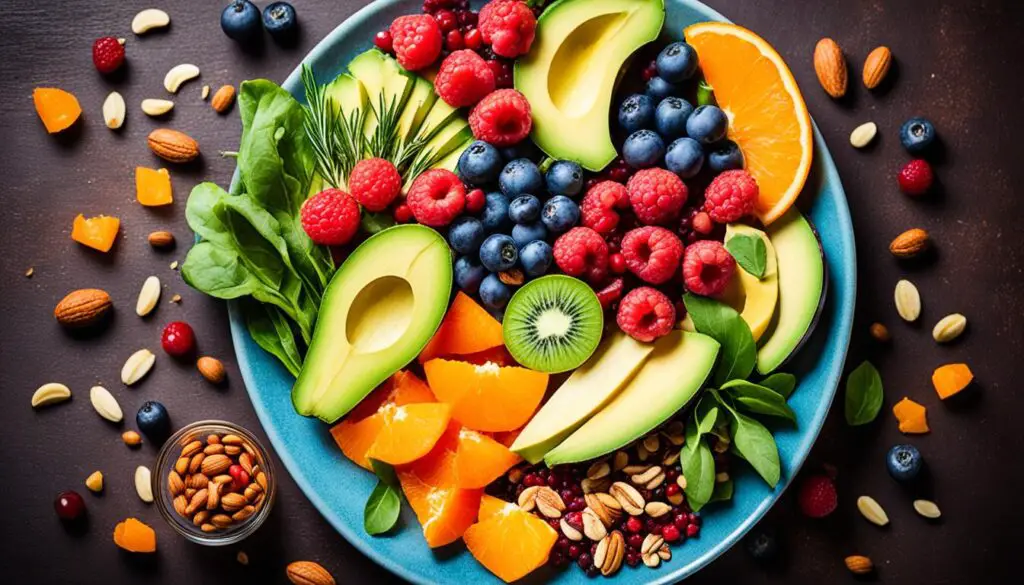
When following a vegetarian HCG diet, it is important to pay attention to your nutrient intake to avoid potential deficiencies. Cutting out animal products from your diet can lead to a shortfall of key essential nutrients.
Vegetarians on the HCG diet should focus on ensuring they receive adequate amounts of iron, zinc, vitamin B12, and calcium to maintain optimal health. These essential nutrients play crucial roles in various bodily functions, including energy production, immune system function, and bone health.
Iron: Iron is essential for red blood cell production and oxygen transport throughout the body. Good plant-based sources of iron for vegetarian HCG dieters include spinach, lentils, tofu, and fortified cereals. However, it is essential to note that the iron derived from plant sources is not as easily absorbed by the body compared to animal sources.
Zinc: Zinc is necessary for immune system function, wound healing, and DNA synthesis. Vegetarian sources of zinc include whole grains, nuts, seeds, legumes, and dairy products.
Vitamin B12: Vitamin B12 is crucial for the production of red blood cells and maintaining a healthy nervous system. It is primarily found in animal-based foods, so vegetarian HCG dieters may need to rely on fortified plant-based products like cereals, plant-based milks, and nutritional yeast. Additionally, vitamin B12 supplements are a recommended option.
Calcium: Calcium is essential for maintaining strong bones and teeth, as well as supporting muscle function. Vegetarians can obtain calcium from plant-based sources such as almonds, tofu, broccoli, kale, and fortified plant-based milks.
To ensure that you are meeting your nutrient needs while on the vegetarian HCG diet, it may be necessary to take daily vitamin supplements. These supplements can help fill any potential nutritional gaps and support overall health.
Vegetarian Protein Substitutes on the HCG Diet
Meeting the protein requirements of the HCG diet can be a challenge for vegetarians, but there are plenty of plant-based options available. Incorporating vegetarian protein substitutes into your HCG diet can help ensure you maintain a balanced nutrient intake while on the program.
Tofu is a versatile and popular choice for vegetarian HCG dieters. It provides a good amount of protein and can be used in various recipes, such as stir-fries, salads, or even as a tofu scramble for breakfast.
Another option to consider is tempeh, which is made from fermented soybeans. Tempeh is packed with protein, and its nutty flavor works well in dishes like curries or on the grill as a burger patty substitute.
Edamame, young soybeans, is also an excellent source of protein. These vibrant green soybeans can be boiled or steamed and enjoyed as a snack or added to salads, soups, or stir-fries.
If you prefer a convenient and quick protein source, soy protein powders are worth considering. These powders can be easily mixed into smoothies or used to make protein-rich pancakes or baked goods.
Benefits of Vegetarian Protein Substitutes
Choosing plant-based protein options on the HCG diet has several advantages. Not only do they provide the necessary protein to support your body during the low-calorie phase, but they are also rich in essential nutrients and fiber. Additionally, vegetarian protein substitutes are often lower in saturated fat than animal-based proteins and can help with weight management and overall health.
“By incorporating tofu, tempeh, edamame, or soy protein powder into your HCG diet, you can ensure you’re meeting your protein needs while following a vegetarian lifestyle.”
Remember to consult a healthcare professional or nutritionist before making any major dietary changes, especially when following a restrictive diet like the HCG diet. They can provide personalized advice and ensure you’re meeting all your nutrient requirements.
Sample Vegetarian HCG Diet Meal Plan
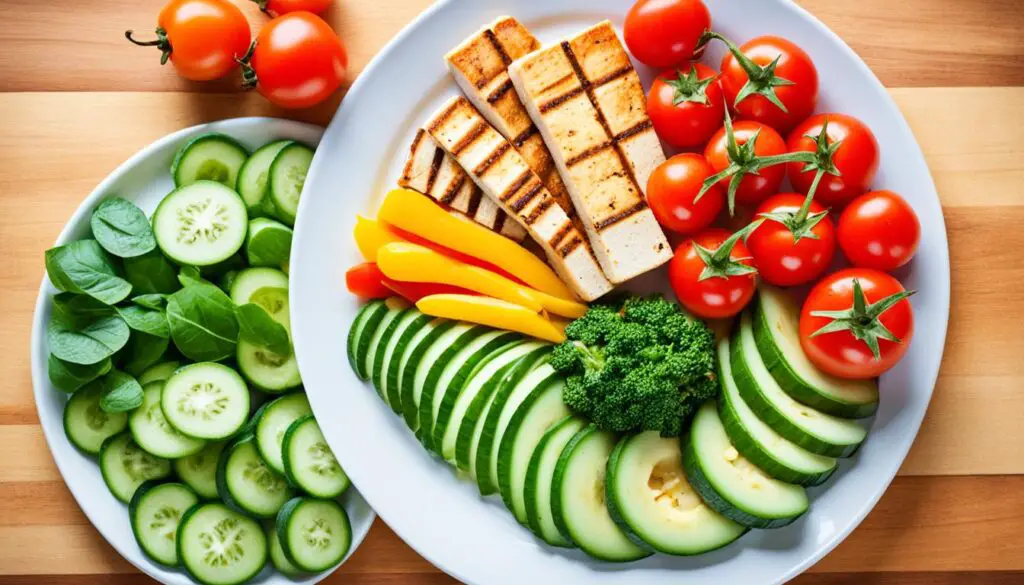
Planning meals is crucial for vegetarians on the HCG diet. Following a well-balanced and nutrient-rich meal plan can ensure that vegetarian HCG dieters meet their dietary requirements while staying within the calorie limits. Here is a sample vegetarian HCG diet meal plan to provide ideas and inspiration:
- Breakfast: Scrambled egg whites with vegetables
- Lunch: Edamame salad
- Dinner: Tofu stir-fry
- Snack: Cottage cheese
By including a variety of low-calorie and high-protein options, this sample meal plan ensures that vegetarians on the HCG diet can maintain satiety and meet their nutritional needs. Let’s take a closer look at each meal:
Breakfast: Scrambled Egg Whites with Vegetables
For a high-protein and low-calorie breakfast, start your day with scrambled egg whites cooked with a variety of colorful vegetables. This option provides essential amino acids and micronutrients to support your body’s functioning.
Lunch: Edamame Salad
Enjoy a refreshing edamame salad for lunch. Edamame is rich in plant-based protein and fiber, helping to keep you full and satisfied. Pair it with a variety of fresh vegetables and a light dressing for added flavor.
Dinner: Tofu Stir-Fry
For dinner, opt for a delicious and nutritious tofu stir-fry. Tofu is an excellent source of vegetarian protein and can be cooked with a medley of colorful vegetables. Use minimal oil and flavorings to keep the calorie count low.
Snack: Cottage Cheese
As a snack, enjoy a serving of cottage cheese. Cottage cheese is high in protein and low in calories, making it a perfect choice for vegetarians on the HCG diet. Pair it with a small portion of fresh fruits for added taste and nutrients.
Remember, this is just a sample meal plan, and you can customize it according to your preferences and dietary needs. Incorporating a variety of low-calorie vegetables, plant-based proteins, and healthy snacks will help you stay on track while following the vegetarian HCG diet.
Challenges of the Vegetarian HCG Diet
The vegetarian HCG diet presents its own unique set of challenges that may pose difficulties for individuals following a vegetarian lifestyle. Two primary challenges stand out: the lack of lean protein options and the potential for nutrient deficiencies.
1. Lack of Lean Protein Options
One of the main challenges for vegetarians on the HCG diet is the limited availability of lean protein options. The traditional HCG diet emphasizes animal protein sources, which are restricted for vegetarian dieters. This lack of dietary variety can make it harder to meet the protein requirements of the diet while adhering to vegetarian preferences.
2. Potential Nutrient Deficiencies
Another challenge vegetarians may face on the HCG diet is the risk of nutrient deficiencies. Cutting out animal products from the diet can create gaps in essential nutrients such as iron, zinc, vitamin B12, and calcium. These nutrients are typically found in animal-based foods, making it crucial for vegetarians to find alternative sources or consider supplementation.
Overcoming these challenges requires careful planning and monitoring of nutrient intake. Vegetarians on the HCG diet must ensure they are getting enough protein from plant-based sources and addressing potential deficiencies through dietary adjustments or appropriate supplements.
By understanding and proactively addressing these challenges, vegetarians can effectively navigate the HCG diet while maintaining a balanced nutrient intake.
Tips for Success on the Vegetarian HCG Diet
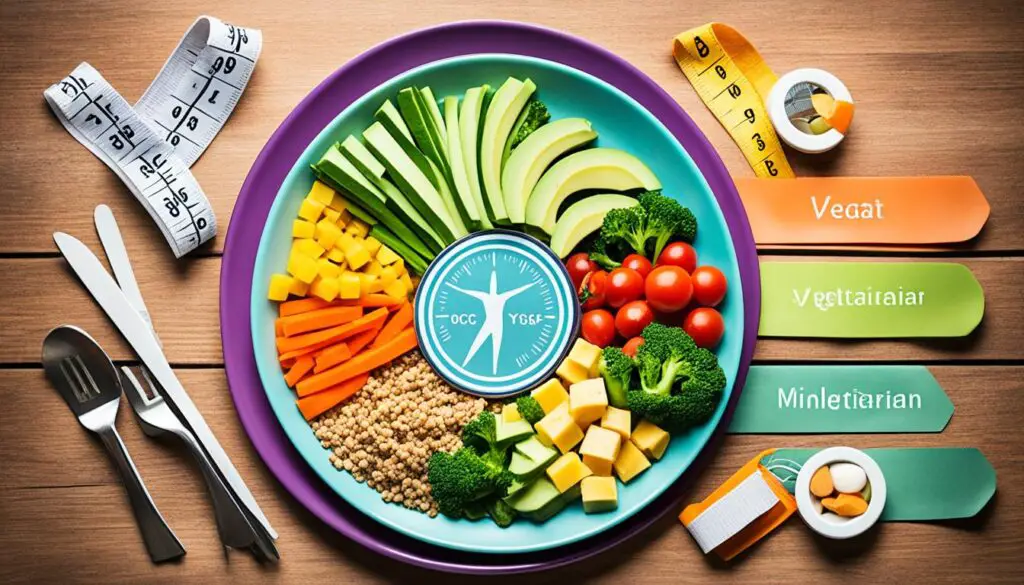
Embarking on the vegetarian HCG diet can be a challenging endeavor, but with proper planning and support, you can achieve success. Here are some essential tips to help you navigate the diet and achieve your goals.
1. Plan Your Meals in Advance
Meal planning is crucial when following the vegetarian HCG diet. Take the time to plan your meals for the week, ensuring they are low in calories and high in protein. Include a variety of vegetarian protein sources like tofu, tempeh, and soy products. This way, you can stay on track and have nutritious meals readily available.
2. Track Your Protein Intake
Protein is a vital component of the vegetarian HCG diet, and it’s important to ensure you’re getting enough. Keep track of your protein intake to ensure you meet the recommended daily requirements. This can be done by using a food journal or utilizing online tools and apps that help you track your nutrients.
3. Seek Support from Online Communities or Healthcare Professionals
Support is essential when embarking on any diet, including the vegetarian HCG diet. Joining online communities or seeking guidance from healthcare professionals who specialize in the HCG diet can provide you with valuable tips, motivation, and accountability. They can also help address any concerns or challenges you may face along the way.
4. Incorporate Protein Shakes
Protein shakes can be a convenient and effective way to supplement your protein intake on the vegetarian HCG diet. Look for vegetarian-friendly protein powders and incorporate them into your daily routine. Protein shakes can be a quick and satisfying option, especially when you’re on the go.
5. Stay Hydrated
Drinking plenty of water is crucial for overall health and can also help support your weight loss efforts on the vegetarian HCG diet. Aim to drink at least eight glasses of water per day, or more if you’re exercising. Staying hydrated can help curb cravings and keep you feeling full.
6. Focus on Long-Term Sustainable Eating Habits
While the vegetarian HCG diet may yield quick results, it’s important to focus on long-term sustainable eating habits. Use this diet as an opportunity to learn about nutrition, portion control, and mindful eating. Incorporate a variety of plant-based foods into your diet to ensure a balanced nutrient intake even after completing the HCG diet.
By following these tips and staying committed to your goals, you can find success on the vegetarian HCG diet. Remember to tailor the diet to your individual needs and seek guidance from healthcare professionals for personalized advice.
Disclaimer: Always consult with a healthcare professional before making any significant changes to your diet or exercise routine.
Is the Vegetarian HCG Diet Recommended?

While the HCG diet is controversial and generally not recommended by healthcare professionals, there is potential for vegetarians to adapt it to their dietary preferences. However, it is crucial to undergo medical supervision when making drastic changes to the diet. A healthcare provider can assess individual health needs, monitor progress, and provide guidance throughout the dieting process.
Although the HCG diet may offer some short-term weight loss benefits, it is important to note that the lack of scientific evidence supporting its efficacy and potential risks associated with the hormone injections raise concerns among healthcare professionals.
“The HCG diet has not been proven to be effective for long-term weight loss or sustainable overall health. Instead, I recommend prioritizing balanced, nutrient-dense eating habits that are tailored to individual needs,” says Dr. Jane Thompson, a renowned dietitian.
Seeking medical supervision and guidance is especially important for vegetarians who may face additional challenges in meeting their nutrient needs on the HCG diet. A healthcare professional can evaluate the suitability of the diet for an individual’s specific dietary requirements and offer personalized recommendations.
Benefits of Medical Supervision for the Vegetarian HCG Diet
1. Customization: A healthcare provider can tailor the diet to accommodate vegetarian preferences and ensure nutrient adequacy.
2. Nutrient Monitoring: Regular check-ups and blood tests can help identify and address any nutrient deficiencies that may arise due to dietary restrictions.
3. Expert Guidance: Healthcare professionals can provide valuable guidance on meal planning, portion control, and sustainable dietary habits beyond the diet duration.
Considerations for Medical Supervision
1. Safety: The HCG diet, even when modified for vegetarians, involves a very low-calorie intake. Medical supervision can help ensure the diet is carried out safely and without compromising overall health.
2. Support: Having a healthcare professional to offer support and accountability can increase adherence to the diet and improve overall success.
3. Monitoring Progress: Regular check-ins with a healthcare provider can track progress, manage any potential health concerns, and make necessary adjustments to the diet plan.
Remember, the HCG diet, including the vegetarian version, should only be attempted under the guidance and supervision of a qualified healthcare professional.
Potential Benefits and Considerations of the Vegetarian HCG Diet
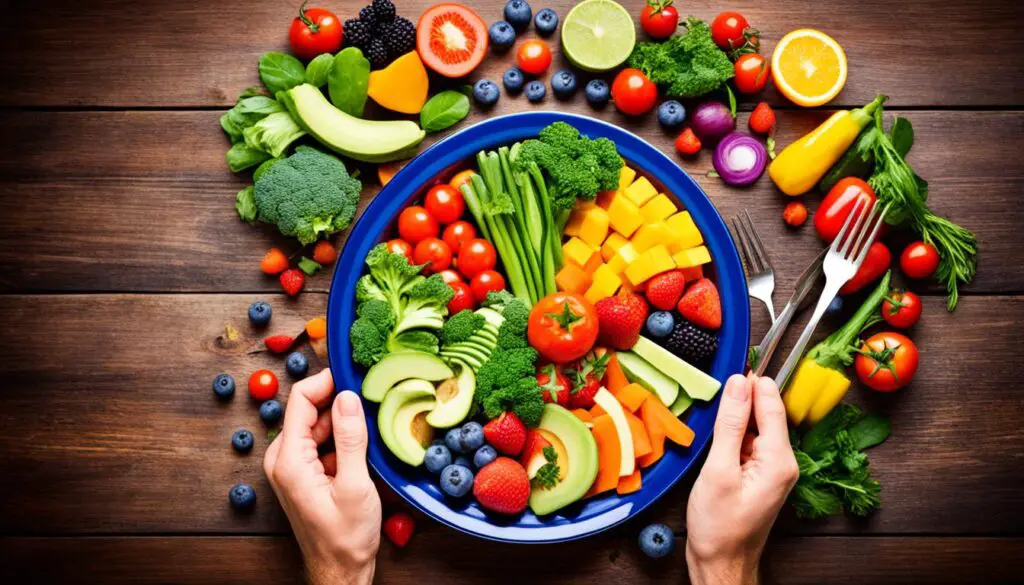
The vegetarian HCG diet offers several potential benefits to individuals who follow a vegetarian lifestyle. Some of these benefits include:
- Rapid weight loss: The HCG hormone, coupled with a low-calorie diet, can help individuals achieve quick and significant weight loss.
- Adherence to a vegetarian lifestyle: By adapting the HCG diet to align with their dietary preferences, vegetarians can maintain their commitment to avoiding animal products.
However, there are important considerations to take into account before starting the vegetarian HCG diet. One of the main considerations is the potential for nutrient deficiencies. The diet restricts calorie intake and limits food options, which can make it challenging to obtain all the necessary nutrients. Nutrients such as iron, zinc, vitamin B12, and calcium may be lacking in a vegetarian HCG diet.
Another consideration is the rigidity of the diet. Following a strict 500-calorie daily intake can be difficult and may not be sustainable for everyone. It’s important to consider whether the diet aligns with your lifestyle and individual needs.
In the pursuit of rapid weight loss and adherence to a vegetarian lifestyle, it is crucial to prioritize long-term health and balanced eating habits. Sustainability should be the focus after completing the vegetarian HCG diet.
| Potential Benefits | Considerations |
|---|---|
| Rapid weight loss | Potential nutrient deficiencies |
| Adherence to a vegetarian lifestyle | Rigidity of the diet |
Conclusion
After careful consideration, it is clear that the vegetarian HCG diet can be tailored to meet the needs of vegetarians. However, it is crucial to approach this diet with caution and prioritize careful planning and monitoring to avoid nutrient deficiencies. With the right guidance, vegetarians can achieve success on the HCG diet while maintaining a balanced nutrient intake.
Once the diet is completed, it is essential to shift the focus to long-term sustainable eating habits. While the vegetarian HCG diet may offer benefits such as rapid weight loss and adherence to a vegetarian lifestyle, it is important to address potential nutrient deficiencies and be mindful of the rigidity of the diet.
By incorporating these considerations and adopting a thoughtful approach, the vegetarian HCG diet can be a viable option for vegetarians seeking to achieve their health and weight loss goals. However, it is recommended to consult with a healthcare provider to ensure proper medical supervision and personalized guidance tailored to individual health needs.
FAQ
How can I avoid deficiencies on a vegetarian HCG diet?
To avoid deficiencies on a vegetarian HCG diet, it is important to plan meals carefully and incorporate a variety of nutrient-rich foods. Including sources of protein such as dairy products, eggs, tofu, and soy products can help meet your protein requirements. Additionally, consider taking daily vitamin supplements to fill any potential nutritional gaps.
What are some vegetarian options for the HCG diet?
Vegetarian options for the HCG diet include dairy products, eggs, soy products, and protein powders. These can be used as substitutes for animal proteins and help meet the protein requirements of the diet.
Which essential nutrients should vegetarians on the HCG diet pay attention to?
Vegetarians on the HCG diet should pay attention to their intake of nutrients like iron, zinc, vitamin B12, and calcium. These nutrients are commonly found in animal products, so it may be necessary to supplement or incorporate plant-based sources to meet the recommended daily intake.
What are some vegetarian protein substitutes on the HCG diet?
Vegetarian protein substitutes on the HCG diet include tofu, tempeh, edamame, and soy protein powders. These plant-based options can help vegetarians meet their protein requirements while on the diet.
Can you provide a sample vegetarian HCG diet meal plan?
A sample vegetarian HCG diet meal plan could include scrambled egg whites with vegetables for breakfast, edamame salad for lunch, tofu stir-fry for dinner, and cottage cheese as a snack. It is important to focus on low-calorie and high-protein options while meeting the requirements of the diet.
What are the challenges of the vegetarian HCG diet?
The challenges of the vegetarian HCG diet include the lack of lean protein options and the potential for nutrient deficiencies. It is important to plan meals in advance, track protein intake, and seek support from online communities or healthcare professionals to overcome these challenges.
What are some tips for success on the vegetarian HCG diet?
Some tips for success on the vegetarian HCG diet include planning meals in advance, tracking protein intake, incorporating protein shakes, drinking plenty of water, focusing on long-term sustainable eating habits, and seeking support from online communities or healthcare professionals.
Is the vegetarian HCG diet recommended?
The vegetarian HCG diet, like the HCG diet in general, is controversial and generally not recommended by healthcare professionals. However, if you decide to try the diet, it is important to have medical supervision when making drastic changes to your diet. A healthcare provider can assess your individual health needs and provide guidance.
What are the potential benefits and considerations of the vegetarian HCG diet?
The potential benefits of the vegetarian HCG diet include rapid weight loss and an improved adherence to a vegetarian lifestyle. However, it is important to consider the potential nutrient deficiencies and the rigidity of the diet. After completing the diet, it is essential to prioritize long-term sustainable eating habits.
What are the final thoughts on the vegetarian HCG diet?
The vegetarian HCG diet can be modified to meet the needs of vegetarians, but it requires careful planning and monitoring to avoid nutrient deficiencies. With the right approach and guidance, vegetarians can experience success on the HCG diet while maintaining a balanced nutrient intake. It is essential to prioritize long-term sustainable eating habits after completing the diet.

